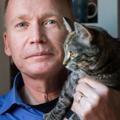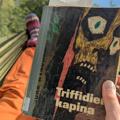Edit (26 May 2022): I just learned that neurofeedback therapy is not only real, but FDA-approved. Here I was, naively thinking that this book was near-future science fiction. But no, it is pretty much now.
‘Every one of us is an experiment, and we don’t even know what the experiment is testing.’
This was my first experience reading Richard Powers, and it was unfortunately somewhat underwhelming. The epigraph had a line from Lucretius which got me very excited, because who doesn’t love
De rerum natura? But… this book is nowhere near that level; in fact, go read Lucretius instead, you’ll be better off for it. Sure, there are some clever turns of phrase, but the prose is filled with them to the point that they seem mundane, not revelatory. The characters are somewhat stocky; once you meet them, it’s not hard to understand their personalities, and they don’t experience major, shifting character arcs. The plot is also fairly predictable, given the novel’s themes. In short, this novel is the opposite of subtle. But… I also didn’t hate it, so there is something to be said for it.
One of the strengths of this book is that it speaks to the sense of primeval wonder one gets from simply looking up at the stars on a cloudless night, or pondering the nature of modern technology and the expanisve rate of innovation; these are wondrous things that we often take for granted. The chapters are interspersed with ‘planetary trips’, which are the father’s bedtime stories to his son. At first the description of planets was exciting and wondrous, but the pace and tone of these trips dwindles towards the end of the book for… what are obvious reasons when you consider the plot. Still, in these initial chapters, the prose was captivating, even if a bit repetitive.
The plot is straightforward, and owes a lot of inspiration to
Flowers for Algernon, which is not-so-subtly referenced directly in the novel. Theo refuses to entertain the idea that his son, Robin, has a ‘disorder’ (read: autism) and put him on medication. Now, I can sympathize that there is a lot of hyperpathologization of kids these days—but medication is a real treatment, and it helps a lot of kids. Theo is not having this—he sees them as a reprehensible evil. Instead, he signs him for experimental ‘therapy’ that turns his tantrum-having, unpredictable child into a mature, blissful creature who seems beyond his years. Given the themes I’ve hinted at, it’s not hard to guess what storyline Powers will give us. All I can say is that I probably wasn’t as emotionally moved by it as much as the author might expect.
Moreover, I struggled to care about the characters. Robin, surprisingly, grew on me a little bit in the course of the novel. Seeing him achieve a sage-like persona was uncanny and odd at first, but his struggles with his sense of self resulting from the experiment were fascinating and captured well. On the other hand, I felt intense dislike for Theo. As a parent, he is irresponsible and immature; as a person, he seems incredibly selfish. He is an astrobiologist, but deviates from mainstream medicine and acts like he has superior knowledge to everyone else, and bristles at the suggestion that someone might know something he doesn’t. The novel also puts a lot of stock into Aly, the mother who died before the novel, but her ‘flashback’ and memories referenced in the novel didn’t generate a fleshed-out character; she was more like an echo of herself, and not a terribly interesting one.
Speaking of Aly, the novel’s main message is heavy-hitting and Powers will hit you over the head with it over and over: humanity is awful, and we are destroying the planet. Yeah, great. Everybody knows this already, at some level, but I suppose we prefer to not acknowledge it. Robin’s character is interesting because he tries to undo the former notion and emphasize the latter, but the father’s perspective, Theo, is incredibly pessimistic, which I didn’t get. What is the point of the story—what are we to take away from this misanthropic father and his innocently life-embracing child? It’s an odd match, and I didn’t invest much in their father-son moments. These are important messages and deserve to be emphasized, but I’m not convinced that this story does a great job of it. If you want something on the negativity of the anthropocene, then
Parasyte by Hitoshi Iwaaki deals with this in a much more intriguing way.
Oh and minor rant: the novel is supposed to be set in the near future and on the verge of apocalypse, but it pulls directly from the four years of America under Donald Trump, along with the craziness that came along with, and the climate disasters etc. associated with the recent past—even a damn pandemic. So the novel hints that it’s ‘near-future’, but includes events that feel like they happened last week—it’s whiplash, and does not immerse me in the story. Rather, it is like a sharp plunge of cold water that makes me want to put the book down… if only I had. That said, Powers has a few funny moments of imitating a certain notorious Twitter user, and they were laughable, even if a bit over the top.
I’m not convinced of the praise for this book either. The ‘clever’ moments of writing are formulaic and heavy-handed, and sometimes they sound really clever but in actuality make little sense. The characters are annoying and barely tolerable at best, and I’m not a fan of immature characters or literal children. I thought about giving this 2 stars, but one of them would probably be a pity star, and even though this was longlisted for the Booker, I don’t think it has imparted any great wisdom or knowledge or appreciation for something outside of the comforts of my life, at least not anything I’m not already familiar with. So… it was a quick and okay-ish read, but I can’t say I actively enjoyed it.
See also:
Matthew Ted's review, which has many points I agree with.
This book was selected using a random number generator, so that I can perhaps whittle down the ever-growing To Read Next collection on my Kobo.













